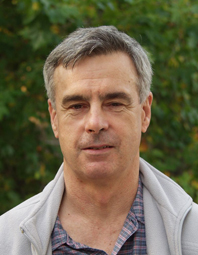
John Steel, Ph.D.
Professor der Mathematik
University of California, Berkeley
Born in 1948 in Stockton, CA
Studied Philosophy at Stanford University and Philosophy and
Mathematical Logic at the University of California, Berkeley
Schwerpunkt
Inner Model Theory
Arbeitsvorhaben
Kanonische innere Modelle für starke Axiome großer Kardinalzahlen
Strong axioms of infinity have been a focal point of research in the foundations of mathematics for over 40 years. There are at least two reasons for this. First, many natural mathematical statements are neither provable nor refutable using only ZFC, the commonly accepted set of axioms. One can remove significant parts of the incompleteness of ZFC in a natural way by strengthening its axiom of infinity. Second, there is the remarkable phenomenon that for any natural theory T extending ZFC, there seems to be a theory S obtained by adding strong axioms of infinity to ZFC such that the consistency of T is equivalent to that of S. In this way, strong axioms of infinity give us a sort of yardstick that we can use to calibrate the strength of arbitrary extensions of ZFC.One important way of understanding and using strong axioms of infinity is to construct canonical minimal universes of sets in which these axioms hold true. The prototype for these "inner models" is Godel's universe L of constructible sets. At the moment, we have a good theory of such inner models in many cases, but we have not been able to construct them for some of the most useful strong axioms of infinity. The goal of this project is to construct inner models for these axioms.
Recommended Reading
Martin, Donald A. and John R. Steel. "A Proof of Projective Determinacy." Journal of the American Mathematical Society 2 (1989): 71-125.
Martin, Donald A. and John R. Steel. "Iteration Trees." Journal of the American Mathematical Society 7 (1994): 1-71.
Steel, John R. "Mathematics Needs New Axioms." Bulletin of Symbolic Logic 6 (2000): 422-433.
Kolloquium, 14.03.2006
Gödel's Programm
Gödels Programm ist eine Annäherung an die Frage: Welches sind die richtigen Axiome für die Mathematik?
Eine vorläufige Antwort auf diese Frage ist im späten 19. und frühen 20. Jahrhundert gegeben worden. Damals wurde gezeigt, dass alle mathematischen Aussagen in der Sprache der Mengenlehre formuliert werden können und dass alle Theoreme, die bis zu diesem Zeitpunkt bewiesen waren, von einer bestimmten Liste grundlegender Aussagen über Mengen abgeleitet werden können. Diese Liste ist unter dem Namen Zermelo-Fraenkelsche Mengenlehre mit Auswahlaxiom oder ZFC bekannt.
Die berühmten Theoreme Kurt Gödels aus den 1930er Jahren zeigten, dass die ZFC in einigen wichtigen Hinsichten unvollständig ist. Insbesondere unter Berücksichtigung der Ergebnisse von Gödel (1937) und Cohen (1963) wird Cantors Kontinuumshypothese von der ZFC weder bewiesen noch widerlegt. Gödels Arbeit schlug auch einen Weg vor, die Unvollständigkeit der ZFC in einigen Fällen zu beseitigen, nämlich durch die Verstärkung des Axioms der ZFC, mit dem die Existenz unendlicher Mengen angenommen wird. Dies führte ihn 1947 zur Formulierung von "Gödels Programm": Entscheide natürliche Fragen mathematisch, wie etwa die Kontinuumshypothese, in gut begründeten Erweiterungen der ZFC z. B. durch die Hinzufügung starker Axiome der Unendlichkeit.
In meinem Vortrag möchte ich die Ursprünge von Gödels Programm genauer beschreiben und einige der Arbeiten skizzieren, die sich mit ihm befassen. Ich möchte auch einige der weitergehenden philosophischen Probleme erörtern, die Gödels Programm aufwirft.
